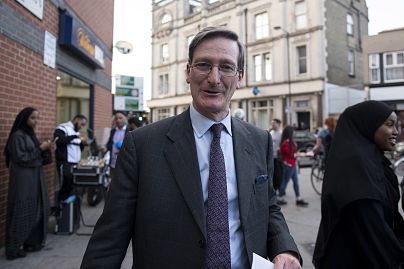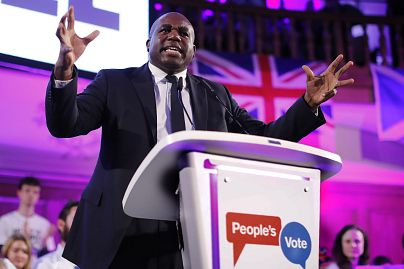"It is going to be a God almighty fight," one rebel lawmaker said.
LONDON — Over the past three years, the grinding battle over Brexit has resulted in stalemate. This week, it looks likely to descend into frantic trench warfare, with rebel lawmakers of all stripes uniting in a desperate attempt to thwart the government's plans.
 ADVERTISEMENT
ADVERTISEMENT
 ADVERTISEMENT
ADVERTISEMENT
Prime Minister Boris Johnson promises to take the United Kingdom out of the European Union on Oct. 31, even if it means leaving without a divorce settlement.
Meanwhile, it seems ever more likely that the U.K. will face a general election this year, with both Johnson and the opposition Labour Party setting out a number of flagship policy pledges in the last few weeks.
On Monday evening, Johnson will meet Conservative Party Members of Parliament at 10 Downing Street, an unusual move that only heightens the expectation of an election announcement.
Trying to prevent that are hundreds of lawmakers who say risking a "no-deal Brexit" is reckless, citing expert forecasts of economic misery, food shortages and civil unrest.
"It is going to be a God almighty fight," opposition Labour Party lawmaker David Lammy said in an emailed statement. "But Parliament will do everything it can to stop Boris Johnson and his disastrous no-deal Brexit."
The showdown was thrust into warp speed Wednesday after Johnson asked Queen Elizabeth II to suspend Parliament for five weeks between September and October. His opponents thought they had a month to act; now they have perhaps 10 days or less.
Johnson's decision to suspend Parliament — officially called "proroguing" — for this long has sparked uproar, with everyone from impartial constitutional experts to former Conservative Prime Minister John Major alleging an undemocratic abuse of power.
The Brexit dispute within the Conservatives is now open civil war, with the party's Scottish leader Ruth Davidson resigning Thursday and partly blaming her disagreements with Johnson over his hard-line Brexit strategy. Major, who ran the country in the 1990s, joined legal action Friday to try to stop Johnson's parliamentary pause.
"It's a terrible mess. Boris Johnson has split the party," Dominic Grieve, a Conservative lawmaker and former attorney general, told NBC News.
Johnson's preemptive strike means he will be difficult to stop. But his opponents maintain they have options.
Legislate
The preference of this motley band of lawmakers is to stop the prime minister by passing a law.
This could order Johnson to ask E.U. leaders for more time or make it illegal for Britain to leave Europe without a deal.
The rebels are keeping the details secret, mindful of giving an advantage to Johnson's team.
"We are going to club together to try to stop that 'no-deal' Brexit, but how we're going to do it, I'm simply not going to tell you," Grieve said. "The next fortnight is going to be very important."
Passing such a law would require John Bercow, the speaker of the House of Commons, to allow the rebels to seize control of the parliamentary calendar.
In the past, similar legislation took five days to rush through the houses of Parliament. Next week, lawmakers may have three or four days.
Johnson's allies have suggested they could try other tactics to soak up time, including filibustering in the House of Lords.
"There are risks because time is very short," Grieve said.
Bring down the government
The second route is more drastic. If the rebels fail to pass legislation in time, their only option may be to attempt to topple the prime minister.
Johnson told the Sunday Times newspaper this week that any Conservative parliamentarians who voted to bring down the government would be kicked out of the party and disallowed from standing for the party in an election.
This would, at least temporarily, leave Johnson without a majority and in charge of a minority government, unable to pass its own laws without help from rival MPs.
Grieve is among those Conservatives who would be willing to collaborate with the opposition Labour Party in what's called a "vote of no-confidence" in Johnson.
Johnson has a majority of just one in the House of Commons. The rebels are confident they have the numbers.
"It is clear if you look at the many Conservatives who have expressed a view on proroguing Parliament, he will lose votes," Lammy said.
That could clear the way for the patchwork alliance to form a caretaker "government of national unity" and put the breaks on "no-deal."
However, Labour leader Jeremy Corbyn has made clear he "will not support any candidate for the job of emergency prime minister other than himself," David Howarth, a professor of law and public policy at the University of Cambridge, wrote.
On the flip side the Conservative rebels "would not support Corbyn. Something has to give for this route to work," Howarth wrote.
Corbyn hails from the far left of his own party and is unpopular among many of his own center-left lawmakers, let alone those on the Conservative right.
Johnson's team has been briefing that if he loses a vote of no-confidence, he would merely call a general election — setting the date a few days after the Brexit deadline. Or he could simply refuse to resign.
"That's where we really would get into really uncharted waters," according to Tim Bale, a politics professor at Queen Mary University of London. "At that point, the queen might well be faced with the dilemma of whether to relieve him of his post."
Drastic measures
Labour lawmaker Clive Lewis has suggested that "the police will have to remove us from the chamber" when Johnson's parliamentary suspension comes into force.
Others have called for a general strike, which in theory would see all workers across a range of industries walk out of their jobs in protest.
Rory Stewart, the former Conservative leadership candidate and government minister, said that he would establish a rival legislature across the street if Johnson suspended Parliament.
"We will hold our own session of Parliament," Stewart told Sky News in June. "We will bring him down."
However, it's not clear how any of these would stop a "no-deal" Brexit.












